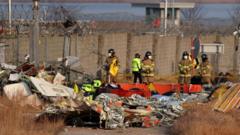On Sunday morning, a Boeing 737-800 operated by the nation's leading budget airline, Jeju Air, was landing at Muan International Airport after returning from Bangkok, Thailand, when it collided with a wall after coming off the runway. The crash, which occurred shortly after 09:00 local time (00:00 GMT), is described as the deadliest in South Korean aviation history.
Preliminary reports suggest that the plane had received a bird strike warning from air traffic control shortly before the crash. According to a South Korean transport official, shortly before making the Mayday call, the flight was instructed to postpone landing due to the alert about potential bird collisions. Eyewitness accounts have revealed that moments before the incident, a passenger sent a message claiming a bird was stuck in the plane's wing, raising concerns about its ability to land safely.
The plane reportedly touched down without engaging its landing gear, which resulted in it skidding along the runway and crashing into a concrete wall, igniting a massive fire. Eyewitnesses described a "loud bang" followed by explosions. A fire chief later disclosed that only the tail section of the aircraft was identifiable, with the rest of the plane unrecognizable and destroyed.
In the aftermath, rescue teams have been deployed, and the flight and voice recorders from the doomed aircraft have been recovered for analysis. Initial findings indicate that the cause could be linked to a combination of bad weather and a potential bird strike, although investigations are ongoing. The head of Jeju Air asserted that maintenance issues were not a factor and noted that the flight's lead pilot had significant experience, totaling over 6,800 hours since 2019.
As local authorities continue recovery operations, emergency healthcare personnel have swelled to over 1,500, tasked with locating victims and aircraft debris. Acting President Choi Sang-mok has designated Muan as a special disaster zone, unlocking governmental support for recovery efforts and victims' families.
The crash has sparked national mourning, with flags lowered at government institutions and family members of the deceased gathering at Muan Airport seeking answers. The grief is palpable among families, nearly all of which lost relatives returning from holiday in Thailand. Jeju Air's chief executive has publicly apologized to the affected families, marking this as the airline's first fatal accident since its inception in 2005.
The investigation continues, and both local and international aviation communities are closely monitoring the situation, much like past incidents linked to bird strikes.
Preliminary reports suggest that the plane had received a bird strike warning from air traffic control shortly before the crash. According to a South Korean transport official, shortly before making the Mayday call, the flight was instructed to postpone landing due to the alert about potential bird collisions. Eyewitness accounts have revealed that moments before the incident, a passenger sent a message claiming a bird was stuck in the plane's wing, raising concerns about its ability to land safely.
The plane reportedly touched down without engaging its landing gear, which resulted in it skidding along the runway and crashing into a concrete wall, igniting a massive fire. Eyewitnesses described a "loud bang" followed by explosions. A fire chief later disclosed that only the tail section of the aircraft was identifiable, with the rest of the plane unrecognizable and destroyed.
In the aftermath, rescue teams have been deployed, and the flight and voice recorders from the doomed aircraft have been recovered for analysis. Initial findings indicate that the cause could be linked to a combination of bad weather and a potential bird strike, although investigations are ongoing. The head of Jeju Air asserted that maintenance issues were not a factor and noted that the flight's lead pilot had significant experience, totaling over 6,800 hours since 2019.
As local authorities continue recovery operations, emergency healthcare personnel have swelled to over 1,500, tasked with locating victims and aircraft debris. Acting President Choi Sang-mok has designated Muan as a special disaster zone, unlocking governmental support for recovery efforts and victims' families.
The crash has sparked national mourning, with flags lowered at government institutions and family members of the deceased gathering at Muan Airport seeking answers. The grief is palpable among families, nearly all of which lost relatives returning from holiday in Thailand. Jeju Air's chief executive has publicly apologized to the affected families, marking this as the airline's first fatal accident since its inception in 2005.
The investigation continues, and both local and international aviation communities are closely monitoring the situation, much like past incidents linked to bird strikes.





















